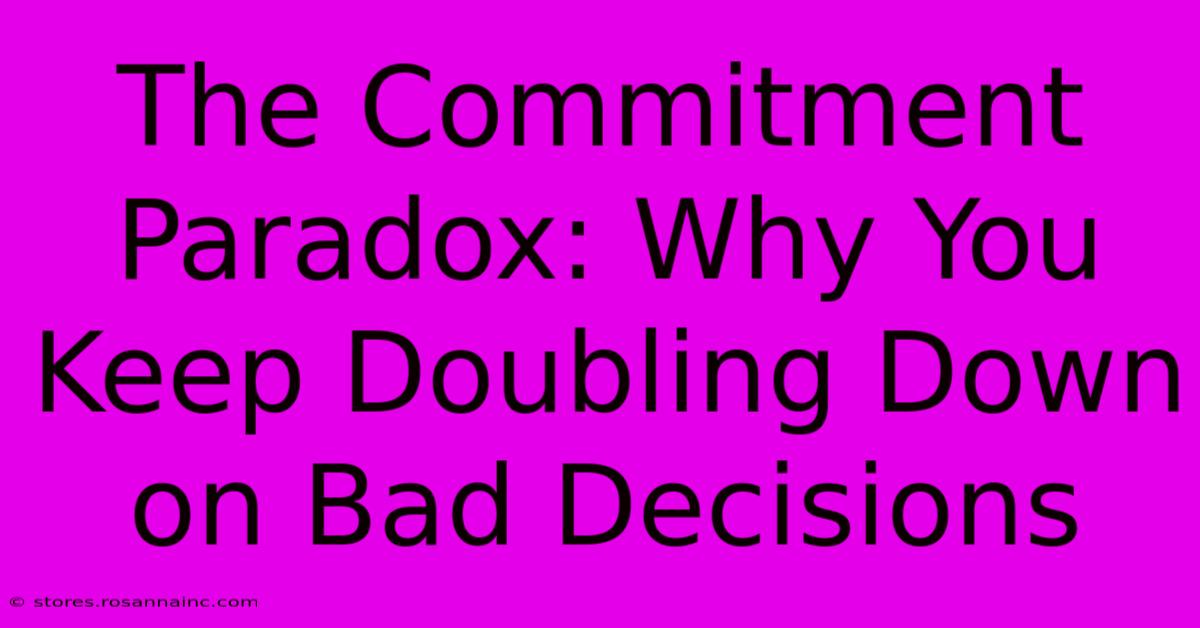The Commitment Paradox: Why You Keep Doubling Down On Bad Decisions

Table of Contents
The Commitment Paradox: Why You Keep Doubling Down on Bad Decisions
We've all been there. You've invested time, money, or emotion into something, and it's clearly not working. Yet, instead of cutting your losses, you find yourself doubling down, throwing even more resources at the sinking ship. This perplexing behavior is known as the commitment paradox, and understanding its underlying mechanisms is crucial to avoiding its pitfalls in both our personal and professional lives.
Understanding the Commitment Paradox
The commitment paradox stems from a powerful psychological phenomenon: cognitive dissonance. This occurs when we hold two conflicting beliefs or ideas simultaneously, creating mental discomfort. When we've committed to something, we want to believe our decision was right. If the outcome is negative, we experience dissonance—the jarring feeling that our efforts have been wasted. To reduce this discomfort, our brains often resort to rationalization, justifying our continued investment, even when logic dictates otherwise.
The Sunk Cost Fallacy
A major driver of the commitment paradox is the sunk cost fallacy. This is the tendency to continue investing in something because of the resources already spent, regardless of its future prospects. We feel obligated to "get our money's worth," even if that "worth" is increasingly elusive. Whether it's a failing business venture, a strained relationship, or a frustrating hobby, the sunk cost fallacy traps us in a cycle of escalating commitment.
Loss Aversion
Another critical factor is loss aversion. Humans feel the pain of a loss more strongly than the pleasure of an equivalent gain. Cutting our losses feels like a defeat, while continuing to invest, even if futile, offers a glimmer of hope of avoiding that painful loss. This psychological bias makes it incredibly difficult to walk away from a failing endeavor.
Breaking Free from the Cycle
While the commitment paradox is a powerful force, it's not insurmountable. By recognizing the underlying psychological mechanisms and employing conscious strategies, you can break free from the cycle of doubling down on bad decisions:
1. Recognize the Symptoms: Self-Awareness is Key
The first step is identifying when you're falling prey to the commitment paradox. Ask yourself:
- Am I continuing this because of the resources already invested, or because it still holds genuine potential?
- Am I avoiding the pain of admitting defeat, or am I genuinely optimistic about the future?
- Would I make the same decision today, knowing what I know now?
Honest answers to these questions can reveal whether you're clinging to a failing endeavor due to psychological biases.
2. Focus on Future Value, Not Past Investment: Shift Your Perspective
Instead of dwelling on what you've already invested, concentrate on the future potential. Will continuing this path yield a positive return? If the answer is consistently "no," it's time to reassess your commitment. Past investments should not dictate future actions.
3. Set Clear Exit Strategies: Plan for the Inevitable
Before embarking on any significant commitment, develop a clear set of criteria for determining when to cut your losses. These should be objective and measurable, not based on emotions or hopes. Having a pre-defined exit strategy makes it easier to make difficult decisions when needed.
4. Seek External Perspectives: Gain Objective Insights
It can be difficult to see the situation clearly when emotionally invested. Seek advice from trusted friends, family, or mentors who can provide an objective perspective and challenge your biases.
Conclusion: The Power of Letting Go
The commitment paradox is a pervasive human tendency, but by understanding its roots and employing the strategies outlined above, you can develop greater self-awareness and make more rational decisions. Remember, the ability to recognize when to cut your losses is not a sign of weakness; it's a mark of strength, resilience, and ultimately, success. Letting go of a bad decision can free up valuable resources – time, energy, and money – to pursue opportunities with a higher probability of success. The sooner you recognize this, the sooner you can break free from the commitment paradox and pave the way for a brighter future.

Thank you for visiting our website wich cover about The Commitment Paradox: Why You Keep Doubling Down On Bad Decisions. We hope the information provided has been useful to you. Feel free to contact us if you have any questions or need further assistance. See you next time and dont miss to bookmark.
Featured Posts
-
Game Changer Cfp Expansion 12 Team Format Set To Shake College Football
Feb 06, 2025
-
Capture Moments With A Whimsical Twist The Ultimate Guide To Holga Lens Photography
Feb 06, 2025
-
Conference Room Etiquette 101 Master The Art Of Professional Collaboration
Feb 06, 2025
-
Elimina El Texto De Cualquier Imagen En Segundos Y Gratis
Feb 06, 2025
-
Cursor Conundrum The Curious Case Of Automatic Table Entry
Feb 06, 2025
